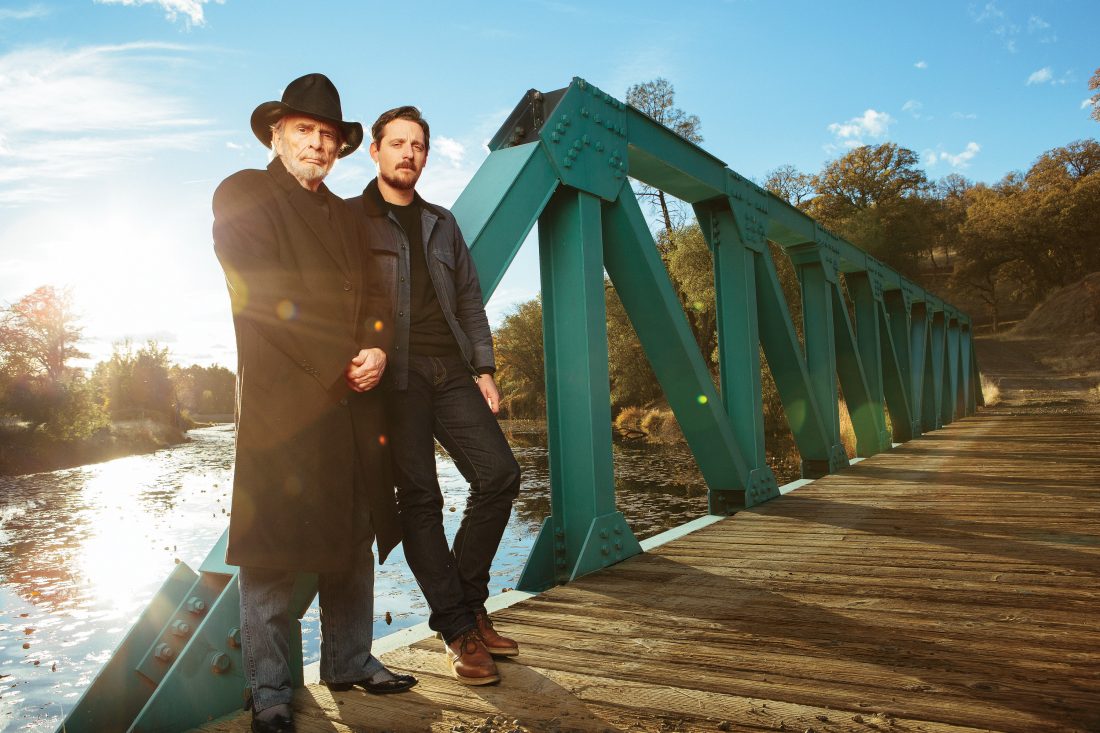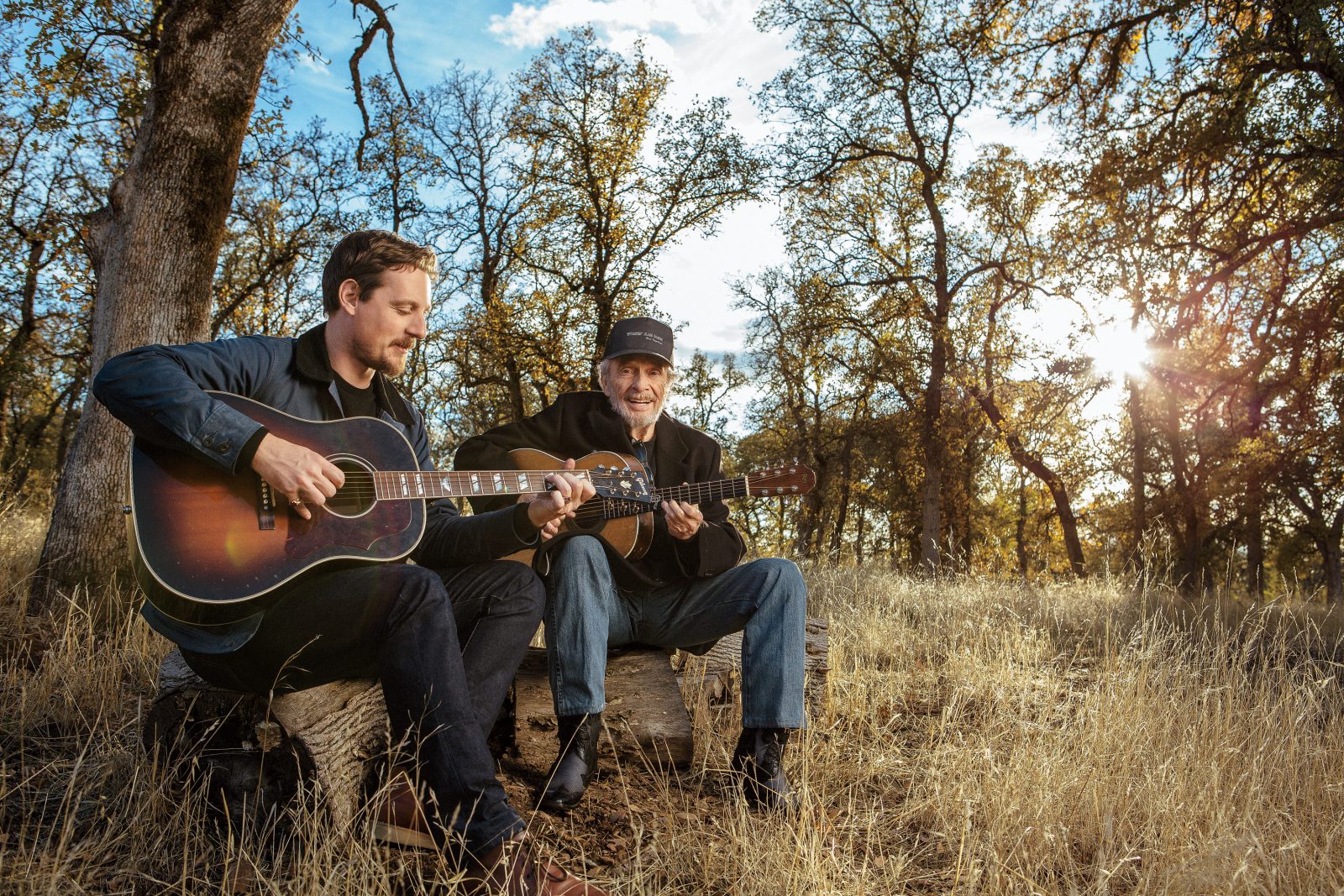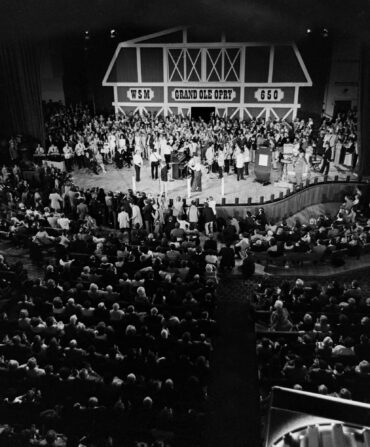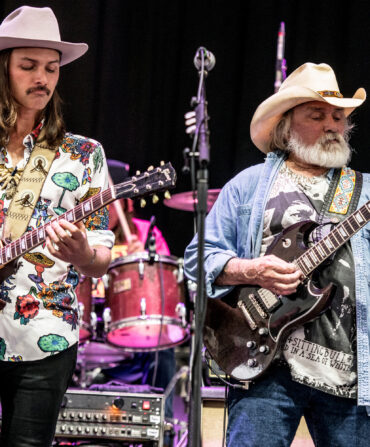Music
The Legend and the Renegade

Photo: David McClister
Outside of Redding, California, down a long dirt road off the highway, sits the compound of Merle Haggard, who along with Willie, Waylon, and Johnny is one of the faces on the Mount Rushmore of outlaw country. The Hag has more than 250 gorgeous acres—a wooded sanctuary with a large pond that shimmers under the warm California sun. Crossing the water is an old train bridge he shipped in to the property—a nod to his railroad days—that leads to a massive building that houses his recording studio, with an attached outdoor stage and a parking spot for his brand-new tour bus. Despite Haggard’s legendary status, he doesn’t live in a mansion but rather a simple ranch house surrounded by a plain white fence. It’s cozy, lived in. Inside on the sectional sofa, Haggard is sitting with the rising outlaw country star Sturgill Simpson, who at Haggard’s invitation has come for a visit on a rare day off from touring. Following the release of Simpson’s sophomore album, 2014’s Metamodern Sounds in Country Music, the Kentucky native has struck a nerve by defying Nashville expectations, with many seeing him as a modern antidote to everything that’s wrong with country music these days—the glitz, the beer-’n’-truck bros, the dance beats, the blandness. His new album, A Sailor’s Guide to Earth, a concept album written as a conversation with his young son, is due out this April.
A former railroad man himself, Simpson clearly reveres Haggard. But the feeling is mutual. “I think he’s about the only thing I’ve heard that was worth listening to in a long time, to be real honest,” Haggard says. While their wives headed to the store to stock up for tonight’s dinner of fish tacos, we sat down with the two musicians for a conversation that ranged from their mutual love for Dolly Parton to the inspiration needed to be a songwriter.

Photo: David McClister
Like Minds
The two musicians trade a couple of notes and swap a few stories.
When did you guys meet?
Simpson: The first time was at a festival and we were on the same stage. Just hanging out. One day you find yourself hanging out with Merle Haggard [laughs]. And we played a show with you and Chris Stapleton in Minnesota.
Haggard: Yeah. We’re going to do a lot more shows together, I think, if I don’t die or something.
Merle, I thought your family was asking you to stop touring.
Haggard: They want me to.
Simpson: You just bought a bus. How are you going to stop touring?
Haggard: I can’t. I feel it’s a double-edged sword. It’s what keeps me alive and it’s what f**ks up my life. It’s hard to have a family, so I try and split it up. I try to build a life here of a reasonable sort, and then go and jump on the bus.
Simpson: That’s interesting when you say that it’s what keeps you alive and what destroys your life at the same time. That’s been the biggest thing as far as the transitional aspect of this in my family’s life. It’s been the hardest part for me. Everything coincided around the same time, my son being born and then my record took off, and then I spent the first year of his life on the road, watching him grow through pictures. That was all a little bittersweet and hard to swallow some days.
Haggard: It’s like the old saying: “You want to make God laugh, tell him your plans.”
Simpson: Exactly. You can’t look a gift horse in the mouth because it’s providing for our family. Even if I don’t get to see him, my life is better off than it would have been when I was still stocking shelves at a grocery store or whatever, trying to be a songwriter, working at the railroad.
Sturgill, do you remember the first Merle song you heard?
Simpson: Probably from my grandfather. Merle and Marty Robbins was about all he listened to for as long as I can remember. “Big City” was the one. He had it in his Bronco when he worked in a strip mine. All those eight-tracks were in there all the time.
Merle, how did you get turned on to Sturgill?
Haggard: I heard [the song] “Long White Line” and it knocked me out. Then I got to see him in person and I was impressed with his work. I guess it was his understanding of what he was doing and how good he was at it. I think he knew what his target was and he hit it.
Sturgill, do you think you hit that target?
Simpson: I don’t know. It changed my life, for better or worse. We’ll see. I certainly didn’t have any intentions. I don’t even think I was ready to make that record. When we made it, we just had a week off and Dave [Cobb, Metamodern’s producer] had a week off. It’s like “Let’s get in here, bang some stuff around, and see what happens.” Four days later, we had a record. And I think because it happened like that, so quickly, it was probably the only reason that we made the record we did. Personally, I thought my first record, High Top Mountain, was a better album. I put a lot more effort and craft into the songs. I worked harder on it.
Do railroad men have a code? Something that bonds you?
Haggard: I think there is something. It’s like a guy that has been to prison. You pick up on somebody else that has been there. I think of railroaders that way. I met a lot of railroaders and we all seemed to have something in common.
Simpson: It’s an environment. Certainly like now, if I hear a passing train or a horn, it affects me much differently than it did before. You hear that and, for me, it’s a reminder of why I should really keep working at music.
Haggard: That’s exactly it. I hear that whistle and I don’t want to go back to that. I’ve been on enough trains to know that if you make a living at it, you had to go out and do that every day. That’s hard on your brain. You could get killed at any second.
Merle, do you have a routine for writing songs?
Haggard: No. I don’t have any idea how to start. It comes to you and you…
Simpson: Either write it down or you don’t.
Haggard: If you’re in a position to capture what you’re thinking about, then sometimes it works. I don’t sit down and say, “I’m going to try to write something today.” I don’t do that.
You never did?
Haggard: Nope. I started as a child when I was in school scribbling. I learned how to write songs, many of them that weren’t any good. The good ones are like somebody hands it to you. You write it down and try to remember or put it down on some kind of recorder. Then it becomes almost like an addiction. That’s another reason I appreciate Sturgill. He’s not going for the shit that people normally go for when he’s writing and playing guitar. You don’t have to ask, “Who’s the bandleader?” You know what I mean? It’s his deal. I like all that. I don’t see any of that nowadays. I had way too big a band for a long time. I had two drummers at one point.
Simpson: How do you find two good drummers?
Haggard: That’s why I don’t do it anymore [laughs].
Simpson: I took a lot from your shows in terms of segueing into songs. You just keep a continuous flow, because I don’t like to talk a lot at the shows. I get really, really nervous. The thought of having to go up and talk or entertain gives me anxiety.
Merle, do you have any other advice?
Haggard: Somebody asked Roger Miller that one time. He said, “Don’t carry your picks and your pills in the same box” [laughs]. Willie has some wisdom about that. He says, “Do what you want to do. In case somebody likes it, then you have to go do it again.” In other words, Sturgill’s doing what he wants to do. That’s the most important thing. No advice from this corner. I’m a fan. I want to see what he comes up with.
Sturgill, how would you describe your new record?
Simpson: I’m not the guy for that. It’s where my heart was at the time, I guess. Some people might love it, some might not. I feel the same way about the new one as I felt about the last one before it came out. I’m nervous, but I made the record I wanted to make and the record I needed to make, I guess. I’m not even sure it’s a country record, to be honest with you.
Haggard: Good. If it’s like what they’re calling country, you don’t want to go near that shit. I can’t say anything good about it. I wish I could.
Merle, you said in 2009 that country music would never return to its roots.
Haggard: I said that?
Yeah. You feel differently?
Haggard: I think a better way to express what I meant was I don’t believe we’ll ever pass that way again. The environment will never be so befitting as it was at one time. There was a big thing that happened in our business when they started closing all the army bases. Each one of those bases supported several bars, and the bar business has died in America. When it died, a certain kind of picker had no place to play. It messed our lives up. There was no place for a guy to get an education to be an entertainer.
Simpson: I never thought of that. Fewer and fewer bars are doing live music. Instead it’s more DJs and dance parties. Now if kids are in a band, they’re limited on the number of venues where they can go and just do those little forty-minute sets with five other bands that night. There’s nowhere other than towns like Nashville and Austin where awesome musicians can get up and play for four or five hours doing covers, and like he’s saying, that’s when you’re learning to get your chops. That stuff is hell for any artist, but it’s also a necessary part of learning the craft.
Merle, you should go play in Europe—they love country music over there. I saw Dolly Parton play at the Glastonbury Festival to about 120,000 people. It was an ocean of human beings. I was a mile away from the stage and I swear to God I could feel her energy.
Haggard: Oh, she’s hot, isn’t she? She’s the most charismatic human being alive. She’s Marilyn Monroe with a guitar. She’d make Marilyn Monroe take the dirt road. She and I toured America together in 1974–75. We worked all year. She was tremendous. She had just written “Jolene” and “I Will Always Love You” and “Coat of Many Colors.”
Sturgill, do you think about longevity at all?
Simpson: A career like these guys have had? No, I don’t know how they did it. You’d have to be machines to do what they’ve done. Between being in the navy and the railroad and everything else I’ve ever done in my life, I never knew what tired was until I was at this job. But you get off the road for two or three weeks and you’re sitting on the couch, you don’t really know what to do with yourself. I’m not meant to sit on the couch and not play music. But I never want to feel like I have to put out a record. I don’t want to ever make those records.
Haggard: That’s where I’m at. That’s not a good place to be. I’m living proof of what you’re talking about. Maybe I’ve said everything that I want to say.
Simpson: You played me a great song on your bus. If you’ve got nine more of those, you’re in a real good spot, boss. I’m just saying.
Haggard: I never got to put that down.
Simpson: You didn’t record that?
Haggard: No.
Simpson: My God.
Haggard: Maybe there’s something else I’m supposed to write, but I don’t have it written yet and I’m getting anxious. If I don’t write something that’s pretty good once in a while, I’m like a frustrated old whore, I’m hard to get along with. I need to write to express my feelings, I guess. Of course, I want it to be recognized. I want people to like it. I think it’s probably the most rewarding part of my life. But I need some inspiration. I need to write something that says something. There’s a lot going on in the world.
Simpson: There’s so much going on that it numbs my mind that you don’t hear more people writing about it. You can’t live in a cocoon the whole time. My wife uses a railroad analogy: It’s tough to tell how fast a train is going when you’re on it.
Haggard: That’s exactly it. We’ll write that, Sturg. There might be a song in that.
Matt Hendrickson has been a contributing editor for Garden & Gun since 2008. A former staff writer at Rolling Stone, he’s also written for Fast Company and the New York Times and currently moonlights as a content producer for Ohio University’s Voinovich School of Leadership and Public Service in Athens, Ohio.







